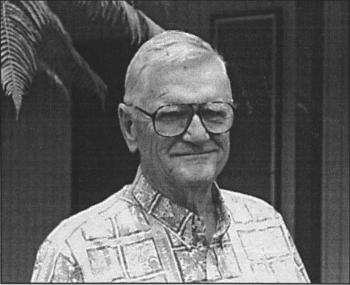Harold P. Luscomb

Tsunamis Remembered: Oral Histories of Survivors and Observers in Hawai‘i
Life history interviews with individuals who witnessed and survived tsunamis-particularly the 1946 and 1960 disasters on the Big Island of Hawai'i. Thirty individuals-mostly residents of Hilo and Laupahoehoe-recall their experiences before; during, and after the 1946 and 1960 tsunamis which were arguably the most destructive natural disasters in modem Hawaiian history.
Harold P. Luscomb was born April 27, 1926 in Turtle Creek, Pennsylvania, a suburb of Pittsburgh. His Hilo-bom father, Harold P. Luscomb, Sr., had moved to Pennsylvania to work for Westinghouse Electric Company and to work toward a degree in electrical engineering. There he met his wife, Helen Jones Luscomb. Harold Jr., the couple's only child, was raised at the home of his maternal grandparents in Pittsburgh. At the age of ten, Harold, his father, and mother moved to Hilo, where his father was employed by Hilo Electric Light Company. They rented a house in the Pu'u'eo district. Luscomb attended Hilo Standard, Hilo Intermediate, and Hilo High schools, graduating in 1944. He briefly attended the University of Hawai'i at Manoa before returning to Hilo and working on the waterfront as a part-time freight clerk for Hilo Transportation and Terminal Company. In 1950, Luscomb was hired by C. Brewer & Company, Ltd. and assigned to Onomea Sugar Company, working first as a statistical clerk, then bookkeeper. At the time of the 1960 tsunami, he was the sugar plantation's office manager. On May 23, 1960, Luscomb was called upon to assist the county and state in securing heavy equipment from Big Island sugar plantations in the effort to clean up Hilo after the tsunami. Luscomb's primary responsibility was to coordinate logistics with the Hawai'i Island Planters Association and individual plantation managers in obtaining equipment and work crews for the massive job. Luscomb retired in 1983 as vice-president of property planning and control for Hawaiiana Investment, Inc., a subsidiary of C. Brewer & Company, Ltd. He lives in Hilo with his wife of fifty years, Signe Carlson Luscomb. The couple raised three children and have three grandchildren.
Scope and Content Note
Pennsylvania-born man talks about his father, a Hilo Electric manager; Puueo neighborhood; and Hilo education. He also covers Hilo's social hierarchy, events of December 7, 1941, sugar industry, waterfront jobs, and the 1949 longshore strike. After the 1960 tsunami, he helped coordinate the sugar plantations' equipment and personnel in the massive cleanup. He also summarizes the history of sugar in Hawaii.
Program Note:
This interview is part of the Center for Oral History's project Tsunamis Remembered: Oral Histories of Survivors and Observers in Hawai‘i. Interviews from this project are available in the Center's ScholarSpace open access repository.
The Center for Oral History (COH), in the Department of Ethnic Studies at the University of Hawaiʻi at Mānoa, collects, documents, preserves and highlights the recollections of Native Hawaiians and the multi-ethnic people of Hawaiʻi. It produces oral histories and interpretive historical materials about lifeways, key historic events, social movements and Hawaiʻi’s role in the globalizing world, for the widest possible use.
Please Note: The oral histories in this collection are protected by copyright and have been created for educational, research and personal use as described by the Fair Use Doctrine in the U.S. Copyright law. Please reach out Voices@noaa.gov to let us know how these interviews are being used in your research, project, exhibit, etc. The Voices staff can help provide other useful resources related to your inquiry.
The NOAA mission is to understand and predict changes in climate, weather, oceans, and coasts, to share that knowledge and information with others, and to conserve and manage coastal and marine ecosystems and resources. The Voices Oral History Archives offers public access to a wide range of accounts, including historical materials that are products of their particular times, and may contain offensive language or negative stereotypes.
Voices Oral History Archives does not verify the accuracy of materials submitted to us. The opinions expressed in the interviews are those of the interviewee only. The interviews here have been made available to the public only after the interviewer has confirmed that they have obtained consent.
